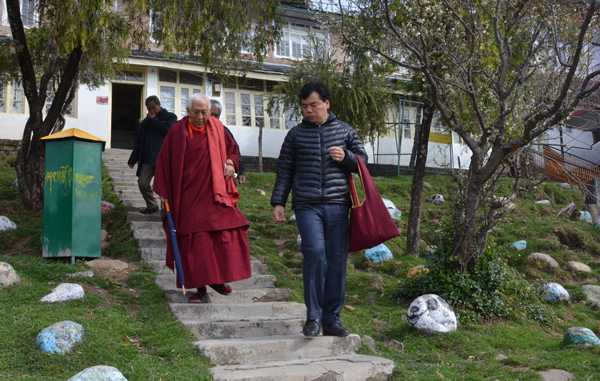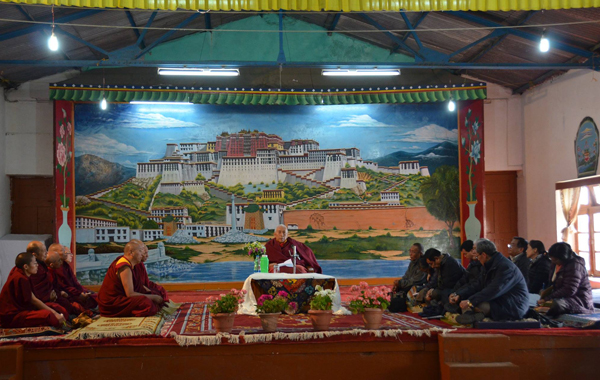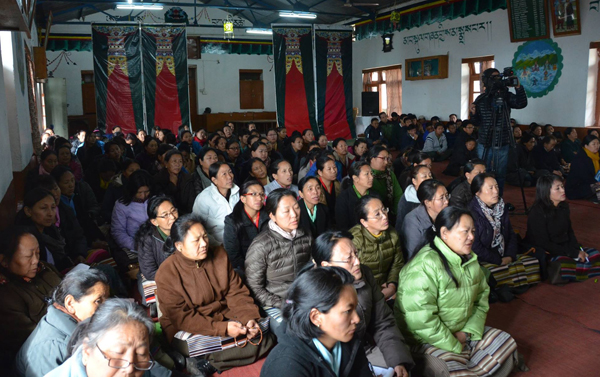Guidance to Teachers and Staff
February 28, 2015
Prof. Samdhong Rinpoche gave a guidance talk to the teachers and staff members of the Upper Tibetan Children’s Village (TCV) School this morning as the school opens for a new academic year.
 His Eminence Rinpoche spoke on the topic “ethical motive, the need for responsible altruism (exalted thought), the relation between teachers and students and caring fostering, the merits and need for inner mutual honesty (pledged sound relation) — in brief, by remembering the kindness of His Holiness the Dalai Lama, to do one’s duties well, thus becoming an offering delighting the Victorious One (His Holiness).”
His Eminence Rinpoche spoke on the topic “ethical motive, the need for responsible altruism (exalted thought), the relation between teachers and students and caring fostering, the merits and need for inner mutual honesty (pledged sound relation) — in brief, by remembering the kindness of His Holiness the Dalai Lama, to do one’s duties well, thus becoming an offering delighting the Victorious One (His Holiness).”
At the start Rinpoche emphasized the need to make a habit of regarding the preciousness of time, and then outlined the need for a discerning wisdom knowing to adopt the positive and discard the faults, for if one has such a wisdom one would be able to know things–what to adopt and what to discard–by oneself, without having to follow other’s hearsay.
 In continuation, Rinpoche pointed out how in the modern civilization people consider the rights greater than duties; by understanding thoroughly through succession of experiences the civilization, Mahatma Gandhi wrote the book “Hind Swaraj”, to point out the shortcomings of the modern civilization.
In continuation, Rinpoche pointed out how in the modern civilization people consider the rights greater than duties; by understanding thoroughly through succession of experiences the civilization, Mahatma Gandhi wrote the book “Hind Swaraj”, to point out the shortcomings of the modern civilization.
As resource means to maintain and develop an ethical conduct in today’s hectic society, Rinpoche recommended [the attendees] to study His Holiness the Dalai Lama’s books “Ethics for The New Millennium” and “Beyond Religion: Ethics for The Whole World”. For those who work in education field, not only they need to be more meticulous and more in-depth than others, they as well need to be able to go about [with their knowledge] by knowing the things by oneself, not by assumption, Rinpoche advised.
 Rinpoche spoke of how the British had created, in the Indian education system, factors for Indians not to have independent mental intelligence.
Rinpoche spoke of how the British had created, in the Indian education system, factors for Indians not to have independent mental intelligence.
Other related insights Rinpoche gave were: How Indians considering English language with greater regard than to their languages reflects how much decline in standards of thoughts or conduct of Indians in general; If one shows an external conduct different to one’s inner thought it is a pretence; First one should recognise well oneself, or in other words, one should have a good identification of oneself; in failing to do so, one would not perfectly know others, resulting in not a good relation between the two; If one feels ashamed of one’s identity as a Tibetan, the purpose of establishing a separate Tibetan school is lost; If Tibetan students were to be taught only mathematics, science and so forth, there would not be the need to establish separate Tibetan schools — they could be sent to other Indian schools; it was rather to make genuinely real (‘qualified’) Tibetans the schools were established; as such all should not forget the original aims of the school.
In continuation, Rinpoche advised: If ethical conduct declines there would not be security and stability in society; the demarcation of what constitutes as ethical and unethical (good and bad conducts) is Non-Violence (Non-Harm); truth and Non-Violence are like the two sides of a coin — therefore, if there is a defect in one, the other too will be defective; because violence and non-violence are categorized so because of the difference in motive, it is therefore necessary to have good benevolent motive.
Rinpoche reminded all that His Holiness’ kindness is not only upon Tibetans but also to the whole world, and there is not a need to mention to any ethical person to remember His Holiness’ kindness.
(Photos/Sangay/LHA)